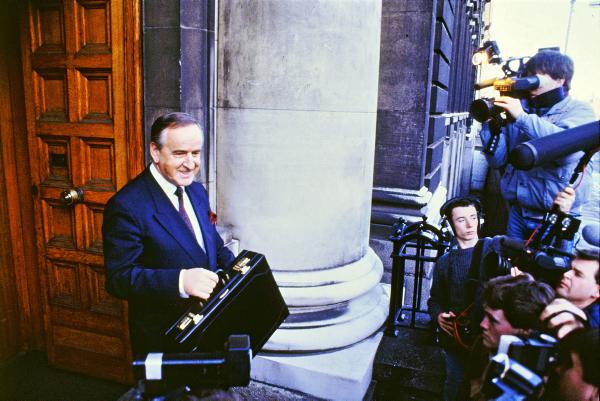Ireland was, as far as we know, a different place then.
The connection between agri industry and politics was real and at times seemed to be all pervasive. Government decisions in crucial areas were opaque.
One of these opaque areas was in the granting of export guarantees.
Albert Reynolds was Minister for Industry and Commerce in Autumn 1987 when the Government took the decision against all official advice, to extend the guarantees to €500m on beef being exported to Iraq. By far, the main beneficiary of these guarantees given by the Irish State was Larry Goodman, AIBP Group and, to a lesser extent Oliver Murphy’s Hibernia Meats. Charlie Haughey was Taoiseach at the time.
A few years later, on May 13th 1991, ITV transmitted an explosive programme devoted to allegations of illegal activities in the beef sector. As a direct result of the programme and a political storm, a special tribunal of enquiry was set up.
Albert Reynolds was Taoiseach and Dick Spring Tánaiste when the report was finally released in August 1994.
In a catalogue of abuses identified by the single member of the Tribunal, Mr Liam Hamilton, Albert Reynolds was cleared of any blame for taking the personal decision to increase the export cover and to allocate the vast bulk of it to AIBP. The report also said that Mr Reynolds did not know that AIBP (and Hibernia) were filling the contracts mainly with beef which was either not produced within the Republic of Ireland or else purchased from intervention. In other words, contrary to the intention of the sales to Iraq, the presence of export guarantees were doing nothing to raise the prices paid to Irish beef farmers.
The Beef Tribunal Report made a significant number of adverse findings against the Goodman Group. Mr Justice Hamilton subsequently became the country’s Chief Justice and Albert Reynolds himself issued a statement saying that he felt fully vindicated by the 900-page report and lengthy, detailed enquiry.
Ireland was, as far as we know, a different place then.
The connection between agri industry and politics was real and at times seemed to be all pervasive. Government decisions in crucial areas were opaque.
One of these opaque areas was in the granting of export guarantees.
Albert Reynolds was Minister for Industry and Commerce in Autumn 1987 when the Government took the decision against all official advice, to extend the guarantees to €500m on beef being exported to Iraq. By far, the main beneficiary of these guarantees given by the Irish State was Larry Goodman, AIBP Group and, to a lesser extent Oliver Murphy’s Hibernia Meats. Charlie Haughey was Taoiseach at the time.
A few years later, on May 13th 1991, ITV transmitted an explosive programme devoted to allegations of illegal activities in the beef sector. As a direct result of the programme and a political storm, a special tribunal of enquiry was set up.
Albert Reynolds was Taoiseach and Dick Spring Tánaiste when the report was finally released in August 1994.
In a catalogue of abuses identified by the single member of the Tribunal, Mr Liam Hamilton, Albert Reynolds was cleared of any blame for taking the personal decision to increase the export cover and to allocate the vast bulk of it to AIBP. The report also said that Mr Reynolds did not know that AIBP (and Hibernia) were filling the contracts mainly with beef which was either not produced within the Republic of Ireland or else purchased from intervention. In other words, contrary to the intention of the sales to Iraq, the presence of export guarantees were doing nothing to raise the prices paid to Irish beef farmers.
The Beef Tribunal Report made a significant number of adverse findings against the Goodman Group. Mr Justice Hamilton subsequently became the country’s Chief Justice and Albert Reynolds himself issued a statement saying that he felt fully vindicated by the 900-page report and lengthy, detailed enquiry.





SHARING OPTIONS